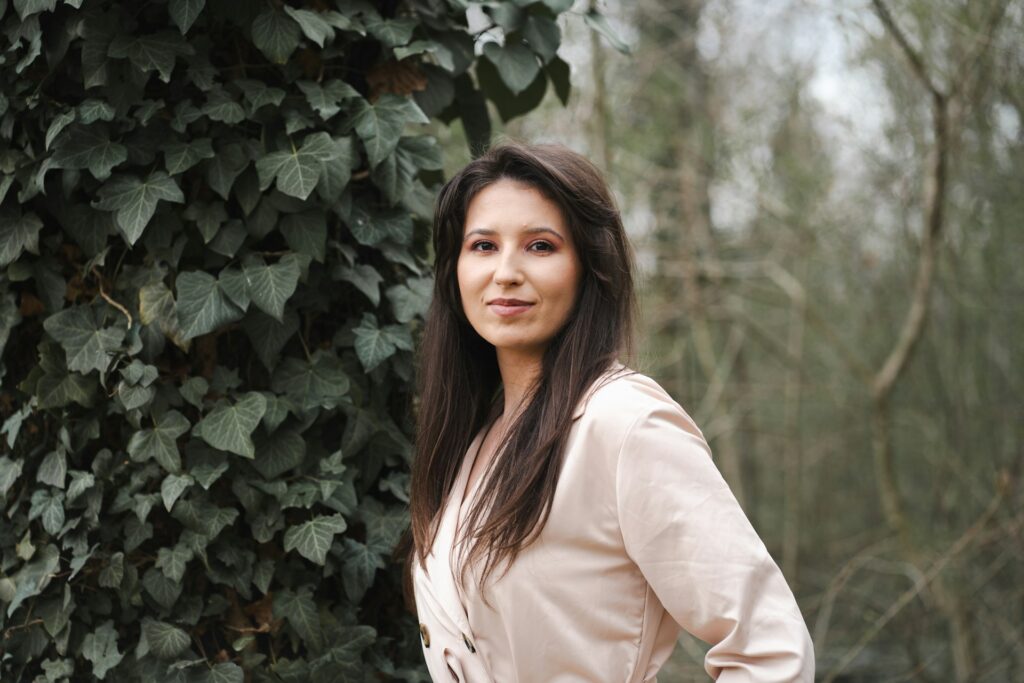For a lot of people, saying no feels a whole lot harder than it should.

You worry you’ll upset someone, damage the relationship, or come across as selfish, even when you’re just trying to protect your peace. However, the ability to say no isn’t cold or unkind—it’s a form of clarity. It helps you show up more fully in the places you actually want to be. If you’re tired of stretching yourself too thin just to avoid guilt, here are some ways to say no with less fear and more confidence.
1. Get clear on what you’re actually responsible for.

It’s easy to confuse being kind with being available to everyone at all times. But you’re not responsible for managing other people’s feelings, expectations, or reactions—only your own boundaries and communication. When you remind yourself that your job isn’t to make everyone happy, it becomes easier to say no without guilt. Their disappointment doesn’t mean you did something wrong—it just means you were honest.
2. Say no without justifying your entire life.

You don’t have to give a full explanation or stack your no with evidence. A simple, clear reason—if any at all—is enough. “I’m not available” is a complete sentence. When you over-explain, you invite negotiation. However, when you state your boundary simply and calmly, it shows you’re grounded in your decision, not asking for permission to make it.
3. Practise neutral, warm language.

Saying no doesn’t have to sound sharp. You can say it with softness and care while still being firm. Phrases like “I won’t be able to,” or “That’s not going to work for me” strike a balance between directness and respect. You don’t need to harden yourself to protect your time. A calm, steady tone often lands better than defensiveness, and it leaves less room for guilt to sneak in afterward.
4. Remember that a good relationship can handle boundaries.

If someone only values you when you say yes, that’s not closeness—that’s convenience. Healthy relationships make room for no. They understand that people have different needs, capacities, and timing. The people who respect your no are the ones who care about the real you—not just the version of you that always says yes. Let those relationships lead the way.
5. Start with small nos to build confidence.

If the idea of saying no feels overwhelming, start small. Decline a casual invite. Say no to an unnecessary favour. Practise in low-stakes situations so you can feel what it’s like to survive the discomfort. Each no you give without apologising teaches your nervous system that it’s safe, and that sense of safety makes it easier to set firmer boundaries when it really counts.
6. Separate someone’s reaction from your decision.

When someone is disappointed by your no, it’s easy to second-guess yourself. But their reaction doesn’t automatically mean you did something wrong. People are allowed to feel things, and so are you. Holding space for someone else’s feelings doesn’t require you to sacrifice your own boundaries. You can care about their disappointment without reversing your decision.
7. Use delay as a tool when you feel cornered.

If you feel pressure to answer right away, it’s okay to buy yourself time. Saying, “Let me check and get back to you” gives you space to reflect instead of people-pleasing on impulse. Rushing often leads to yeses you regret. Giving yourself breathing room helps you respond instead of react, and that makes your no feel much more solid.
8. Remind yourself why you’re saying no in the first place.

Whether it’s to protect your energy, honour your priorities, or avoid burnout, there’s usually a valid reason behind your no. Keep that reason front of mind when guilt shows up. You’re not rejecting someone—you’re respecting yourself. That shift in perspective helps reframe your no as a healthy act, not a selfish one.
9. Avoid softening your no into a maybe.

It’s tempting to leave the door open just to avoid conflict: “I’ll see,” “Maybe later,” “Let me think about it.” But if you already know the answer is no, say it kindly and clearly from the start. Ambiguity only prolongs the discomfort—for you and for them. A respectful no is far better than a hesitant maybe that turns into ghosting or resentment.
10. Rehearse your no before the moment arrives.

If you anticipate a hard conversation, practise what you want to say ahead of time. Saying it out loud—even to yourself—can reduce the emotional weight and help you stay calm when the time comes. Preparation builds confidence. It helps you anchor in your message so you’re less likely to waver or over-explain in the moment.
11. Notice the stories you attach to saying no.

Sometimes, the guilt doesn’t come from the situation—it comes from the story you tell yourself about it. “They’ll think I don’t care,” “They’ll be mad,” “I’m a bad friend.” These thoughts often aren’t true, but they still influence how you feel. Catching and questioning them helps loosen their grip, so you can see the situation more clearly and compassionately.
12. Create a go-to phrase that feels like yours.

Having a few phrases you trust makes it easier to say no without scrambling for the right words. Think: “That’s not something I can commit to right now,” or “I appreciate the ask, but I’ll pass this time.” When the phrasing feels natural, you’re more likely to use it without hesitation. Consistency helps reinforce your boundaries as time goes on.
13. Don’t confuse discomfort with doing something wrong.

Saying no often comes with a wave of discomfort, especially if you’re used to being the reliable one. But feeling uncomfortable doesn’t mean you’re being rude or letting someone down. It just means you’re doing something unfamiliar. Eventually, that discomfort fades—and is replaced by the calm that comes with living in alignment with your real capacity.
14. Remember that every no is a yes to something else.

When you say no to one thing, you’re making space for something else: rest, priorities, mental clarity, or simply breathing room. That’s not selfish—it’s strategic. Framing your no as an act of intention rather than rejection helps remind you what you’re choosing, not just what you’re declining.
15. Let “no” become a normal part of your language.

The more you practise saying no, the more it becomes part of how you move through the world—not something dramatic, but something natural. Boundaries stop being something you have to announce—they become something people expect and respect from you. Eventually, you’ll notice the guilt fading. And in its place? A quieter, stronger sense of self that no longer needs to apologise for honouring your own needs.


